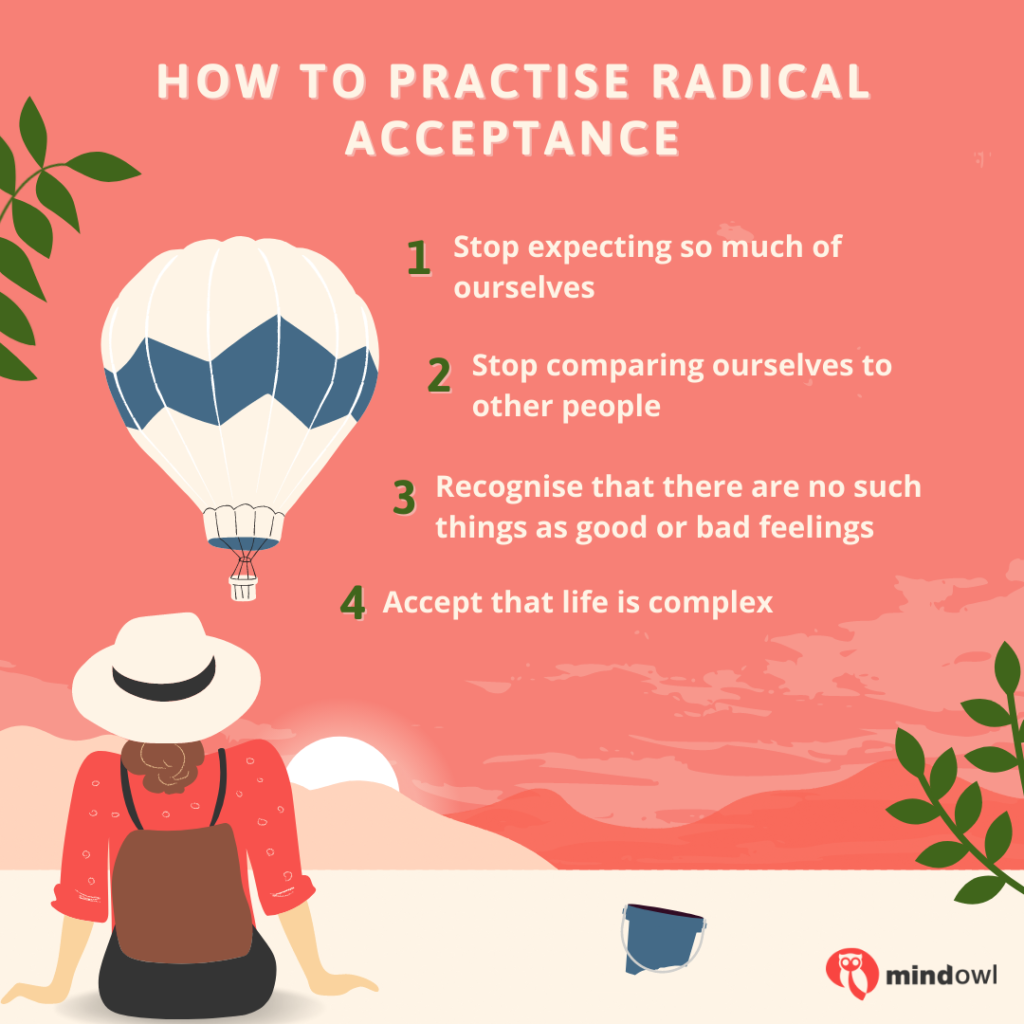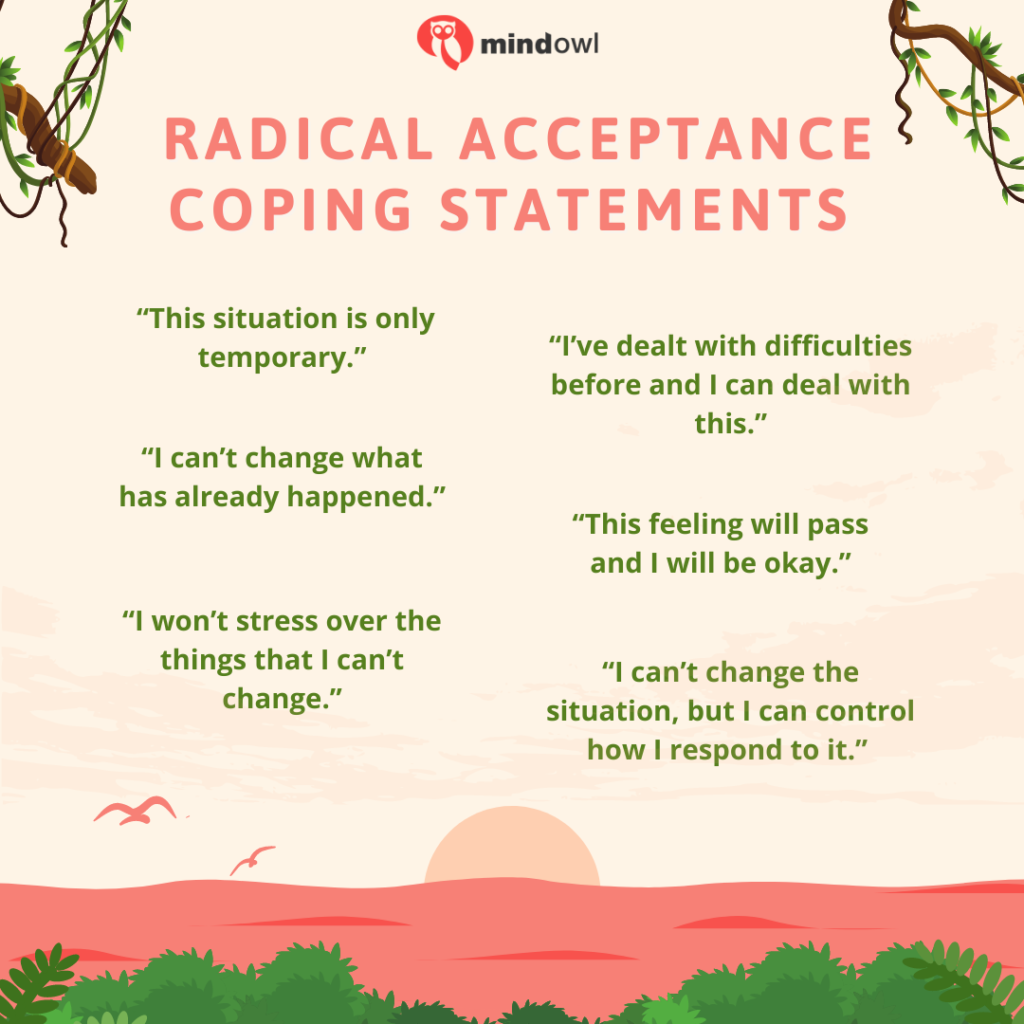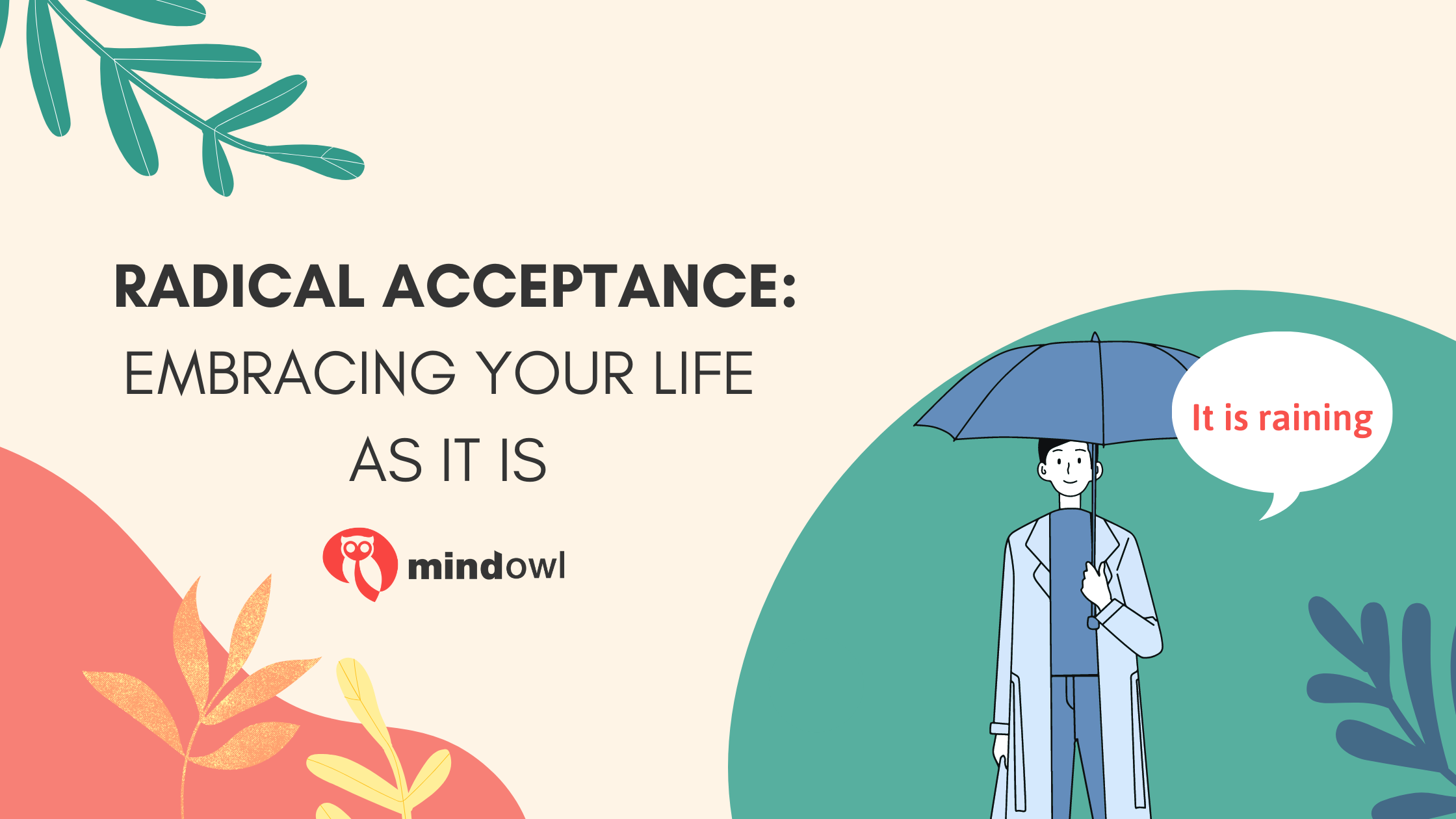It is very important to our sense of wellbeing and mental health that we learn to make peace with the fact that we cannot control everything in our lives. We have all experienced painful situations and times where we felt like nothing was going our way, and it can be easy to slip into negative thought patterns in these moments. One method of counteracting these difficult emotions and painful situations is the practice of radical acceptance. In today’s article, we’ll be delving into this commonly misunderstood practice, offering practical guidance about the right and wrong situations in which to utilize it, as well as discussing how and when it can be brought into your meditation routine. Most importantly, we’ll consider the role radical acceptance can play in helping you find a sense of inner peace and real happiness in life.
What is radical acceptance?
We’ve all had disappointing experiences, like when it rains on the day of a big outdoor event, or our favourite TV character gets killed off, or we find ourselves constantly arguing with someone in our life because we just can’t understand their behaviour. In these difficult situations, we are likely to feel some frustration and despair over things that are out of our control. We might imagine a scenario in which things went the way we would want them to, and compare the reality against that. But by doing so we are only causing ourselves more unnecessary suffering.
Radical acceptance can be understood as an acknowledgement of reality. It requires you to accept that there are events in life that are out of your control; the weather, the plot of the book you’re reading, or the behaviour of others, to name a few examples. Radical acceptance teaches that only by accepting the uncontrollable can we be free from suffering; however, acceptance of reality is easier said than done. If you want to truly achieve radical acceptance then there are many behaviours and reactions that are currently instinctive to you that you will have to unlearn.
Psychologist and author Tara Brach is one of the best-known advocates of radical acceptance philosophy. According to Brach, radical acceptance means “clearly recognizing what we are feeling in the present moment and regarding that experience with compassion”. It’s about breaking away from harmful habits and cultivating kindness and self-acceptance in the face of negative events.
The domino effect
According to psychologist Matthew McKay, who co-authored The Dialectical Behaviour Therapy Skills Workbook, “the present moment never spontaneously leaps into existence without being caused by events that have already taken place. Imagine that each moment of your life is connected like a line of dominoes that knock each other down.” This belief that life is a series of events that you have little control over means that it’s useless to try and assign blame to these events, or to get upset with ourselves over them. To take a previous example, if we plan an outdoor event and it rains, there is no one to blame for the fact that it is raining. Rain is just a part of life. Spending our time complaining about the weather is not going to change the weather – it will only increase our suffering.
This is where radical acceptance comes in. If we accept that there are things in life that are out of our control, we will be more prepared to meet them when they arise. Rather than wasting time lamenting over the fact that the last time we checked the weather forecast it said it wasn’t going to rain, we can accept this as an event completely out of our control and get to work making other arrangements for our event. We could source a gazebo or an indoor venue, or postpone or cancel entirely. Either way, by accepting the rain as something that no one is to blame for, we can sidestep the cycle of suffering, anger, and criticism. So then we can move straight into being proactive. This doesn’t mean that we aren’t upset that our event didn’t turn out the way we had hoped, it just means that we have more chance of making the most of the current situation, and not blaming others or ourselves unnecessarily. This is the difference between pain and suffering; we can feel pain in an uncomfortable situation, but how we react to that painful situation determines whether or not we suffer. You can read more on this topic in our in-depth article on the differences between pain and suffering.

What radical acceptance is not
You may think that this all sounds a bit defeatist, and like you’re surrendering to the negative parts or difficult times in your life. This is not the case. Radical acceptance does not mean you should sit back and accept mistreatment, or give up on having control of anything. Furthermore, acceptance does not imply waving a white flag and surrendering. You still have control over your life and the way that you live it – radical acceptance just means changing your attitude and response to things that you cannot control.
Dialectical Behavioural Therapy
Dialectical Behavioural Therapy (DBT) is a form of therapy that focuses on confronting self-sabotaging behaviours and actions in order to change one’s mindset and increase one’s quality of life. It was developed by Marsha Linehan as a way of treating borderline personality disorder and related conditions, and it is fundamental to modern ideas about radical acceptance. The ‘dialectical’ aspect of DBT refers to the idea of accepting yourself, in order to change yourself. Taking a personality test like Enneagram will help you uncover more parts of yourself and bring to light your strengths and weaknesses. Much like Tara Brach’s fresh interpretations of the human experience, Dialectical Behaviour Therapy points to some very important life lessons that can be applied to our everyday behaviours and interactions. For example, DBT clients are taught how to practise distress tolerance through mindful acceptance of their emotions and thoughts, rather than trying to suppress them. By doing so, they learn to recognise and understand the causes of their emotional reactions, which allows them to make better decisions and choices.
How to practise radical acceptance
Practising radical acceptance in a truly transformative way means applying its teachings to every aspect of your daily life. It can be practised both within daily mindful living and more formal meditation practice; however, the latter is the ideal place to confront negative emotions and experiences, so that’s where radical self-acceptance can be most impactful. Next time you’re meditating, try to consider these next few points:
1. Accepting ourselves
Self-acceptance is something that many people struggle with throughout their adult lives. A number of factors can cause low levels of self-acceptance or self-esteem, but perhaps the biggest cause is the unhealthy amount of value our societies place on exhaustive work ethics and material achievements. Strict views on what is considered success can be very damaging to our mental health, with our lives constricted by false beliefs about how we can find value and self-worth. As a result, we may feel as though we are constantly failing because we don’t have the highest-paid job, the newest technology, or the most expensive car. To accept ourselves we need to stop expecting so much of ourselves and stop believing that material things are the root of a meaningful life. There is no such thing as perfection, so it is futile to spend our entire lives in the pursuit of it.
2. Accepting others
Accepting other people comes when we stop comparing ourselves to them and realise that everyone has flaws and worries. When someone acts in a way that we didn’t like or expect, try to resist making judgments about them, and take note of any intense emotion you may feel, taking a step back and asking yourself whether you’re being fair. Instead of reacting instinctively, try to take into personal experience, challenges, standards, and values of those around you.
3. Accepting our feelings
We often categorise feelings as good or bad, but things aren’t usually that simple. In order to accept our feelings, we need to recognise that there are no such things as good or bad feelings, only feelings that are appropriate to the situation we are in and feelings that are not appropriate. This mindset can help counteract any feelings of deficiency or self-judgment that may arise when we feel sadness or anger in response to an appropriate trigger.
4. Accepting the flow of life
As hard as we may try, life cannot be tamed. We can plan an amazing birthday meal, only for the restaurant to close down. We may decide that we want to start travelling more, and then a global pandemic strikes. Whether it refers to a traumatic event or just a minor inconvenience, there are so many facets of life that we simply cannot control. So rather than cursing or complaining about our lot, we can accept that life is complex and see that we don’t have limited time and waste energy trying to make it bend to our will.

Steps to practice radical acceptance
Here are some steps you may be able to take to improve your ability for radical acceptance. Remember, it’s a skill that gets better with practice. If you are unable to solve a problem or change your perspective on it, then radical acceptance may be the answer.
Try to focus on deep breathing when you’re experiencing extreme emotions. Then examine your thoughts and let them go. For future incidents try to:
- Watch your thoughts for signs of not accepting.
- Remind yourself that reality can’t be changed.
- Think about what you would do if you were able to accept what happened.
- Be aware of how you are feeling in your body.
- Accept that life can be worthwhile even when experiencing pain.
- Identify the events in your life that you are having a hard time accepting.
- Think about the causes of events that you can’t accept.
Radical acceptance coping statements
One way to incorporate radical acceptance into daily life is by using coping statements. These can be thought of as simple sentences to use whenever you experience anything stressful, disappointing, or challenging. You can say these statements out loud, write them down, or keep them in mind. They can also be used as reminders throughout the day that there are things beyond our control.
There is a wide range of coping statements, here are a few:
- “This situation is only temporary.”
- “I’ve dealt with difficulties before and I can deal with this.”
- “I can’t change what has already happened.”
- “This feeling will pass and I will be okay.”
- “I won’t stress over the things that I can’t change.”
- “I can’t change the situation, but I can control how I respond to it.”
- “It’s okay to feel anxious/upset/mad. I can still deal with this effectively.”

These are only a few examples. Try practising with different coping statements to find the ones that work well for you.
The benefits of radical acceptance
Radical acceptance allows us to behave more proactively and less reactively. You will find that even when a painful event around you feels out of control, you yourself will be able to cope much better than you have in the past. Furthermore, by not spending your time trying to assign blame to situations, yourself, and others, you’ll be able to have stronger, more authentic relationships that aren’t suffering under the weight of unrealistic standards or expectations. Most importantly, radical acceptance can help you realise your innate goodness and value, and ultimately lead to reduced suffering in your life. Painful emotions may still occur, and difficult situations may arise, but you will be able to cope with them better and stop yourself from making crippling self-judgments and fuelling unhealthy habits.
Hopefully, this article has helped to demonstrate the importance of radical acceptance and mapped out how it can offer you a method of growing beyond your bad habits or self-sabotaging behaviours. Think about the philosophies of Marsha M. Linehan or Tara Brach, and try to keep those mindfulness teachings alive in your daily life. Supplement that mindful living by infusing your meditation practice with considered applications of radical acceptance, and you’ll be able to see increases in acceptance of reality and life in a deep, meaningful, and sustainable way.
MindOwl Founder – My own struggles in life have led me to this path of understanding the human condition. I graduated with a bachelor’s degree in philosophy before completing a master’s degree in psychology at Regent’s University London. I then completed a postgraduate diploma in philosophical counselling before being trained in ACT (Acceptance and commitment therapy).
I’ve spent the last eight years studying the encounter of meditative practices with modern psychology.


One thought on “Radical Acceptance: Embracing Your Life as It Is”